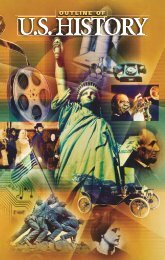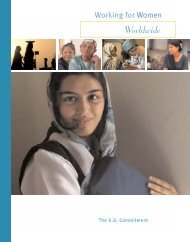Terrorism: Threat Assessment, Countermeasures and Policy
Terrorism: Threat Assessment, Countermeasures and Policy
Terrorism: Threat Assessment, Countermeasures and Policy
Create successful ePaper yourself
Turn your PDF publications into a flip-book with our unique Google optimized e-Paper software.
TRIAL<br />
The U.S. Constitution guarantees a bundle of<br />
important rights to a person charged with a crime.<br />
First, <strong>and</strong> perhaps most important, he has the right to a<br />
speedy <strong>and</strong> public trial. He has the right to confront<br />
the witnesses <strong>and</strong> see the evidence against him. He has<br />
a right to a lawyer at the government’s expense. He has<br />
the right to ask for a jury of impartial ordinary citizens<br />
to decide whether the evidence shows his guilt “beyond<br />
a reasonable doubt.” And he has the right to see any<br />
evidence which the government has found which might<br />
show his innocence.<br />
These rights were afforded the terrorists who were tried<br />
in U.S. courts for the 1993 World Trade Center<br />
bombing, the 1995 Oklahoma City bombing, <strong>and</strong> the<br />
1998 embassy bombings. In the latter case, for<br />
example, lawyers for defendants — indicted along with<br />
Osama bin Laden as members of the al-Qaida network<br />
— succeeded during a five-month trial in having some<br />
criminal charges dismissed, some surveillance declared<br />
unlawful, <strong>and</strong> some evidence against them thrown out<br />
of court. Nevertheless, after hearing 205 witnesses, the<br />
jury found beyond a reasonable doubt that defendants<br />
were guilty of bombing the U.S. embassies.<br />
Despite the government’s unbroken record of success in<br />
terrorist prosecutions, however, they have not been<br />
problem-free. A major drawback in trying terrorists is<br />
that some of the evidence against them (or which they<br />
are entitled to see) may have been obtained from secret<br />
intelligence sources <strong>and</strong> methods. Disclosure of the<br />
evidence may jeopardize such sources <strong>and</strong> methods. In<br />
one terrorism prosecution, for example, the government<br />
had to disclose evidence which had been obtained by<br />
an electronic intercept of a communication by the al<br />
Qaeda network. Within a short time after the disclosure,<br />
the network reportedly stopped using that channel of<br />
communication <strong>and</strong> the intelligence source was lost.<br />
The obvious solution to this risk — keeping the<br />
evidence secret from the terrorist defendant <strong>and</strong> his<br />
lawyers — is prohibited by U.S. law. In non-criminal<br />
immigration proceedings to remove suspected terrorist<br />
aliens from the United States, however, the government<br />
has tried to use secret evidence when it was necessary to<br />
protect intelligence sources <strong>and</strong> methods. This use of<br />
secret evidence, however, may also be unlawful. At least<br />
three lower courts have rejected immigration decisions<br />
in such cases on the ground that using secret evidence<br />
violates the right of aliens to the due process of law<br />
guaranteed by the Constitution. But these decisions<br />
did not dictate whether the government is permitted to<br />
use secret evidence in other parts of the country, <strong>and</strong><br />
the Supreme Court — which could decide this<br />
question for the entire nation — has not yet done so.<br />
Consequently, before September 11, some members of<br />
Congress proposed a law which would have prohibited<br />
the immigration authorities from using secret evidence.<br />
After September 11, the support for such a law has, at<br />
least temporarily, evaporated. Courts must therefore<br />
continue to decide case by case whether secret evidence<br />
can be used in immigration proceedings until the<br />
Supreme Court or Congress settles the question.<br />
CONCLUSION<br />
Bringing terrorists to justice under the rule of law is a<br />
slow, cumbersome, inefficient business. It may even be<br />
an unsuccessful business, if essential evidence is<br />
excluded because it was obtained by unlawful<br />
surveillance, if the government decides that it cannot<br />
risk disclosure of intelligence sources <strong>and</strong> methods, or if<br />
the proof does not show guilt beyond a reasonable<br />
doubt (even though it shows that it is more probable<br />
than not that defendant is guilty). But as the Supreme<br />
Court once said in deciding to free a terrorist who had<br />
been unlawfully tried during the Civil War:<br />
The power of punishment is alone [available] through<br />
the means which the laws have provided for that<br />
purpose, <strong>and</strong> if they are ineffectual, there is an immunity<br />
from punishment, no matter ... how much ... crimes may<br />
have shocked the ... country, or endangered its safety.<br />
By the protection of law human rights are secured;<br />
withdraw that protection, <strong>and</strong> they are at the mercy of<br />
wicked rulers, or the clamor of an excited people.<br />
In its quest for protection from terrorists, the United<br />
States will never give up the protection of law. _<br />
(The opinions expressed in this article are those of the author <strong>and</strong> do not<br />
necessarily reflect the views or policies of the U.S. Government.)<br />
U. S. FOREIGN POLICY AGENDA AN ELECTRONIC JOURNAL OF THE U.S. DEPARTMENT OF STATE VOLUME 6 • NUMBER 3 • NOVEMBER 2001<br />
31












